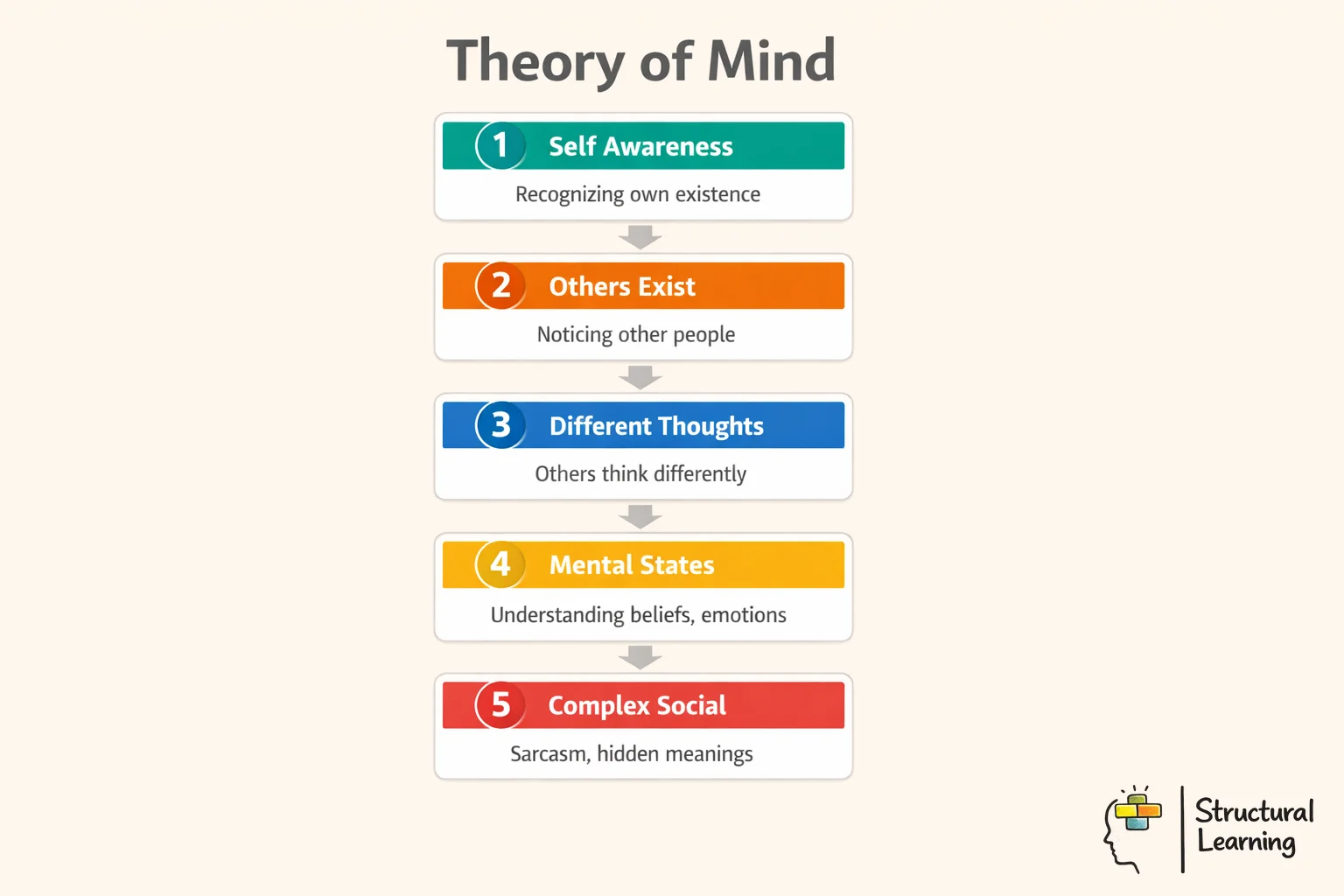Theory of Mind
Learn how the theory of mind shapes children's development in areas such as empathy and socialization. Discover the cognitive skill's implications today.


Learn how the theory of mind shapes children's development in areas such as empathy and socialization. Discover the cognitive skill's implications today.
The theory of mind is a concept in developmental psychology and social psychology that refers to the ability to understand and attribute mental states, such as beliefs, intentions, desires, and emotions, to oneself and others.
Children learn to develop a theory of mind as they grow and explore the world around them through social interactions and experiences. However, theory of mind impairment can occur with developmental delays and brain sciences have been used to better understand this condition. Individuals with a theory of mind impairment may experience challenges in social situation, including understanding others' perspectives, recognising sarcasm or irony, and expressing their own emotions accurately.

At its core, the theory of mind refers to our ability to attribute mental states, such as beliefs, desires, and intentions, to other people. This capacity allows us to predict and interpret the behaviour of others, and to understand that their actions are motivated by their thoughts, social competence, and emotions.
Developmental psychology research states that the concept behind theories of mind is important in social cognition and is believed to be a key component in our ability to interact and communicate with others effectively. The development of the theory of mind begins in the early stages of child developmentand continues to develop throughout one's life. Understanding scientific theories of mind can provide valuable insights into the complexities of human behaviour and improve one's ability to socially interact as well as social competence in everyday life.
the origins and development of theories of mind and their role in social cognition, child development, and implications for our everyday lives. Whether you are a psychology enthusiast or simply curious about the workings of the human mind, learning about the theory of mind can provide valuable insights into the complexities of human behaviour.
Child development is a critical aspect of theories of mind and cognition. Scientific theories of mind have shown that children begin to develop the theory of mind skills around the age of 4 when they start to understand that others have thoughts and feelings that may differ from their own.

Developmental psychology research states that as children grow and develop, their social competence and theory of mind abilities become more sophisticated, allowing them to better understand social situations and navigate complex social interaction and socialization.
Sir Simon Baron-Cohen is a professor and clinical psychologist. Simon Baron-Cohen states that young children's attention to others serves as an integral precursor to their development of the theory of mind. Understanding the role of child development in theories of mind and cognition can help parents, teachers, and caregivers support children's social and emotional growth.
Developmental psychology research states that one of the key implications of the theory of mind development is its importance in social competence. By understanding that others have their thoughts, beliefs, and desires, we are better equipped to navigate social situations and form meaningful relationships.
People with strong theory of mind skills are often better at predicting and interpreting the behaviour of others, which can lead to more successful interactions, child development, and greater empathy. Additionally, scientific theories of mind have been linked to improved communication skills and conflict resolution abilities, making it an essential component of social development.
One way in which theory of mind abilities is developed is through the ability to interpret facial expressions. By understanding the subtle nuances in someone's expression, individuals with strong theory of mind skills can better comprehend the emotions and intentions of others.
This can be especially important in situations where verbal communication may be limited or unclear. Additionally, being able to accurately interpret facial expressions can help individuals navigate social situations more effectively, leading to stronger interpersonal relationships and increased success in personal and professional settings.
 autism-a-classroom-guide"="">Autism Different Perspectives" width="auto" height="auto" id="">
autism-a-classroom-guide"="">Autism Different Perspectives" width="auto" height="auto" id="">Another important aspect of the theory of mind abilities is inhibitory control, which refers to an individual's ability to inhibit his thoughts and behaviours in response to external stimuli. This skill is crucial in child development and social development as it allows individuals to regulate their responses and consider the perspectives of others before acting.
Children with well-developed inhibitory control are better able to pause and think about how their actions might affect others, leading to more considerate behaviour and improved social relationships. This skill also plays a crucial role in academic settings, where students must learn to take turns, listen to others, and respond appropriately to different social cues.
Research in developmental psychology has shown that theory of mind abilities are particularly important for children with autism spectrum disorders and other neurodevelopmental conditions. These individuals may struggle with understanding social cues, interpreting others' intentions, and navigating complex social situations. By understanding the importance of theory of mind, educators and caregivers can develop targeted interventions and support strategies to help these children build stronger social competence and improve their overall quality of life.
Understanding theory of mind has significant implications for educational practice and classroom management. Teachers who recognise the varying levels of theory of mind development amongst their pupils can adapt their teaching strategies to support all learners more effectively. This is particularly important when considering that some children may struggle with understanding implicit social rules, recognising when someone is joking, or interpreting non-verbal communication.
In practical terms, educators can support theory of mind development by explicitly teaching social skills, providing clear explanations of social expectations, and creating opportunities for structured social interaction. For pupils who struggle with theory of mind, visual supports, social stories, and concrete examples can help bridge the gap between their understanding and the complex social world around them.
It's also crucial for teachers to understand that challenges with theory of mind don't indicate a lack of intelligence or capability. Instead, they represent a different way of processing social information that requires targeted support and understanding. By creating inclusive classroom environments that acknowledge these differences, educators can help all pupils develop their social competence whilst celebrating neurodiversity.
The theory of mind represents one of the most fundamental aspects of human social cognition, enabling us to understand and predict the behaviour of others through recognising their mental states. From its emergence around age four through its continued development across the lifespan, theory of mind skills form the foundation of successful social interaction, communication, and relationship building.
For educators, understanding theory of mind provides valuable insights into why some pupils may struggle with social situations, group work, or understanding implicit classroom expectations. By recognising these challenges and implementing appropriate support strategies, teachers can create more inclusive learning environments that support all pupils in developing their social competence and academic potential.
As our understanding of theory of mind continues to evolve through ongoing research in developmental psychology and neuroscience, it becomes increasingly clear that this cognitive ability is not simply a developmental milestone, but a crucial skill that shapes how we navigate the social world throughout our lives. By developing theory of mind development in educational settings, we can help prepare young people for successful social relationships and meaningful participation in their communities.
Perspective-taking development
For those interested in exploring theory of mind research further, the following academic papers provide valuable insights into this fascinating area of developmental psychology:
The theory of mind is a concept in developmental psychology and social psychology that refers to the ability to understand and attribute mental states, such as beliefs, intentions, desires, and emotions, to oneself and others.
Children learn to develop a theory of mind as they grow and explore the world around them through social interactions and experiences. However, theory of mind impairment can occur with developmental delays and brain sciences have been used to better understand this condition. Individuals with a theory of mind impairment may experience challenges in social situation, including understanding others' perspectives, recognising sarcasm or irony, and expressing their own emotions accurately.

At its core, the theory of mind refers to our ability to attribute mental states, such as beliefs, desires, and intentions, to other people. This capacity allows us to predict and interpret the behaviour of others, and to understand that their actions are motivated by their thoughts, social competence, and emotions.
Developmental psychology research states that the concept behind theories of mind is important in social cognition and is believed to be a key component in our ability to interact and communicate with others effectively. The development of the theory of mind begins in the early stages of child developmentand continues to develop throughout one's life. Understanding scientific theories of mind can provide valuable insights into the complexities of human behaviour and improve one's ability to socially interact as well as social competence in everyday life.
the origins and development of theories of mind and their role in social cognition, child development, and implications for our everyday lives. Whether you are a psychology enthusiast or simply curious about the workings of the human mind, learning about the theory of mind can provide valuable insights into the complexities of human behaviour.
Child development is a critical aspect of theories of mind and cognition. Scientific theories of mind have shown that children begin to develop the theory of mind skills around the age of 4 when they start to understand that others have thoughts and feelings that may differ from their own.

Developmental psychology research states that as children grow and develop, their social competence and theory of mind abilities become more sophisticated, allowing them to better understand social situations and navigate complex social interaction and socialization.
Sir Simon Baron-Cohen is a professor and clinical psychologist. Simon Baron-Cohen states that young children's attention to others serves as an integral precursor to their development of the theory of mind. Understanding the role of child development in theories of mind and cognition can help parents, teachers, and caregivers support children's social and emotional growth.
Developmental psychology research states that one of the key implications of the theory of mind development is its importance in social competence. By understanding that others have their thoughts, beliefs, and desires, we are better equipped to navigate social situations and form meaningful relationships.
People with strong theory of mind skills are often better at predicting and interpreting the behaviour of others, which can lead to more successful interactions, child development, and greater empathy. Additionally, scientific theories of mind have been linked to improved communication skills and conflict resolution abilities, making it an essential component of social development.
One way in which theory of mind abilities is developed is through the ability to interpret facial expressions. By understanding the subtle nuances in someone's expression, individuals with strong theory of mind skills can better comprehend the emotions and intentions of others.
This can be especially important in situations where verbal communication may be limited or unclear. Additionally, being able to accurately interpret facial expressions can help individuals navigate social situations more effectively, leading to stronger interpersonal relationships and increased success in personal and professional settings.
 autism-a-classroom-guide"="">Autism Different Perspectives" width="auto" height="auto" id="">
autism-a-classroom-guide"="">Autism Different Perspectives" width="auto" height="auto" id="">Another important aspect of the theory of mind abilities is inhibitory control, which refers to an individual's ability to inhibit his thoughts and behaviours in response to external stimuli. This skill is crucial in child development and social development as it allows individuals to regulate their responses and consider the perspectives of others before acting.
Children with well-developed inhibitory control are better able to pause and think about how their actions might affect others, leading to more considerate behaviour and improved social relationships. This skill also plays a crucial role in academic settings, where students must learn to take turns, listen to others, and respond appropriately to different social cues.
Research in developmental psychology has shown that theory of mind abilities are particularly important for children with autism spectrum disorders and other neurodevelopmental conditions. These individuals may struggle with understanding social cues, interpreting others' intentions, and navigating complex social situations. By understanding the importance of theory of mind, educators and caregivers can develop targeted interventions and support strategies to help these children build stronger social competence and improve their overall quality of life.
Understanding theory of mind has significant implications for educational practice and classroom management. Teachers who recognise the varying levels of theory of mind development amongst their pupils can adapt their teaching strategies to support all learners more effectively. This is particularly important when considering that some children may struggle with understanding implicit social rules, recognising when someone is joking, or interpreting non-verbal communication.
In practical terms, educators can support theory of mind development by explicitly teaching social skills, providing clear explanations of social expectations, and creating opportunities for structured social interaction. For pupils who struggle with theory of mind, visual supports, social stories, and concrete examples can help bridge the gap between their understanding and the complex social world around them.
It's also crucial for teachers to understand that challenges with theory of mind don't indicate a lack of intelligence or capability. Instead, they represent a different way of processing social information that requires targeted support and understanding. By creating inclusive classroom environments that acknowledge these differences, educators can help all pupils develop their social competence whilst celebrating neurodiversity.
The theory of mind represents one of the most fundamental aspects of human social cognition, enabling us to understand and predict the behaviour of others through recognising their mental states. From its emergence around age four through its continued development across the lifespan, theory of mind skills form the foundation of successful social interaction, communication, and relationship building.
For educators, understanding theory of mind provides valuable insights into why some pupils may struggle with social situations, group work, or understanding implicit classroom expectations. By recognising these challenges and implementing appropriate support strategies, teachers can create more inclusive learning environments that support all pupils in developing their social competence and academic potential.
As our understanding of theory of mind continues to evolve through ongoing research in developmental psychology and neuroscience, it becomes increasingly clear that this cognitive ability is not simply a developmental milestone, but a crucial skill that shapes how we navigate the social world throughout our lives. By developing theory of mind development in educational settings, we can help prepare young people for successful social relationships and meaningful participation in their communities.
Perspective-taking development
For those interested in exploring theory of mind research further, the following academic papers provide valuable insights into this fascinating area of developmental psychology:
{"@context":"https://schema.org","@graph":[{"@type":"Article","@id":"https://www.structural-learning.com/post/theory-of-mind#article","headline":"Theory of Mind","description":"Learn how the theory of mind shapes children's development in areas such as empathy and socialization. Discover the cognitive skill's implications today.","datePublished":"2023-04-25T18:25:04.055Z","dateModified":"2026-01-26T10:09:32.212Z","author":{"@type":"Person","name":"Paul Main","url":"https://www.structural-learning.com/team/paulmain","jobTitle":"Founder & Educational Consultant"},"publisher":{"@type":"Organization","name":"Structural Learning","url":"https://www.structural-learning.com","logo":{"@type":"ImageObject","url":"https://cdn.prod.website-files.com/5b69a01ba2e409e5d5e055c6/6040bf0426cb415ba2fc7882_newlogoblue.svg"}},"mainEntityOfPage":{"@type":"WebPage","@id":"https://www.structural-learning.com/post/theory-of-mind"},"image":"https://cdn.prod.website-files.com/5b69a01ba2e409501de055d1/696a125685ac04a0d269f961_696a1250c9a94861bad8a909_theory-of-mind-illustration.webp","wordCount":4637},{"@type":"BreadcrumbList","@id":"https://www.structural-learning.com/post/theory-of-mind#breadcrumb","itemListElement":[{"@type":"ListItem","position":1,"name":"Home","item":"https://www.structural-learning.com/"},{"@type":"ListItem","position":2,"name":"Blog","item":"https://www.structural-learning.com/blog"},{"@type":"ListItem","position":3,"name":"Theory of Mind","item":"https://www.structural-learning.com/post/theory-of-mind"}]}]}